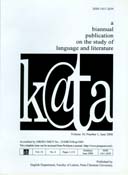Ahmad Tohari’s The dancer: Revisited
Abstract
As with many post-colonial countries, Indonesia has suffered from a long conflict between the military and civil society since its independence in 1945. This struggle is reflected in Ahmad Tohari’s novel entitled The dancer (2012), which has been largely credited as being critical towards the military regime. Using the theories of depoliticisation, I argue that the novel is 1) largely supportive of the military regime due to the oppressive situation as well as the author’s own political line, and 2) influenced by other powers besides the government. The fact that the novel dares to touch the once suppressed subjects of the Indonesian Communist Party (the arch enemy of the regime) and the anti-communist persecution shows a drive for politicisation. Nevertheless, further analysis shows that, by portraying it as highly political, The dancer actually depoliticises the party in that it only reinforces what has been said of the party and removes any alternative points of view. It also represses and depoliticises the military’s persecution and killing of the suspected communists through the pretexts of self-defence, ignorance, and guilt.
Downloads
References
Bodden, M. (2006, August). Rev. of Indonesian literature vs New Order orthodoxy: The aftermath of 1965-1966 by Anna-Greta Hoadley. The Journal of Asian Studies, 65(3), 660-2. [CrossRef]
Adisubrata, J. (Producer), & Yazid, Y. (Director). (1983). Darah dan mahkota ronggeng [Motion Picture]. Indonesia. [CrossRef]
Bodden, M. (2006, August). Rev. of Indonesian literature vs New Order orthodoxy: The aftermath of 1965-1966 by Anna-Greta Hoadley. The Journal of Asian Studies, 65(3), 660-2. [CrossRef]
Bourdieu, P. (1986). The forms of capital. In J. G. Richardson (Ed.), Handbook of theory and research for the sociology of education (pp. 241-58). New York: Greenword. [CrossRef]
Flinders, M., & Buller, J. (2006). Depoliticisation: Principles, tactics and tools. British Politics, 1(3), 293-318. [CrossRef]
Flinders, M., & Wood, M. (2014). Depoliticisation, governance and the state. (M. Flinders, & M. Wood, Eds.) Policy & Politics, 42(2), 135-49. [CrossRef]
Foucault, M. (1981). The order of discourse. In R. Young (Ed.), Untying the text: A post structuralist anthology (I. McLeod, Trans., pp. 48-78). Boston: Routledge & Kegan Paul. [CrossRef]
Foucault, M. (1995). Discipline and punish: The birth of the prison. (A. Sheridan, Trans.) New York: Random House Inc. [CrossRef]
Foulcher, K. (1998). Southeast Asian novels (Indonesia). In P. Schellinger (Ed.), Encyclopedia of the novel. Chicago; London: Fitzroy Dearborn Publishers. [CrossRef]
Garcia, M. N. (2004, October). The Indonesian free book press. Indonesia, 78, 121-45. [CrossRef]
Harmayn, S. (Producer), & Isfansyah, I. (Director). (2011). The dancer [Motion Picture]. [CrossRef]
Hay, C. (2007). Why we hate politics. Cambridge: Polity Press. [CrossRef]
Herlambang, W. (2014, November 24). Wijaya Herlambang: Salihara dan Freedom Institute itu lembaga sampah! (R. Apinino, & F. F. Izzati, Interviewers) Retrieved April 14, 2015, from http://indoprogress.com/2014/11/wijaya-herlambang-salihara-dan-freedom-institute-itu-lembaga-sampah/ [CrossRef]
Heryanto, A. (2006). State terrorism and political identity in Indonesia: Fatally belonging. London: Routledge. [CrossRef]
Hoadley, A.-G. N. (2005). Indonesian literature vs New Order orthodoxy: The aftermath of 1965-1966. Copenhagen: NIAS. [CrossRef]
Huggan, G. (1997). The Neocolonialism of post-colonialism: A cautionary note. Links and Letters, 19-24. [CrossRef]
Lysloff, R. T. (2012). Introduction. In A. Tohari, The dancer (R. T. Lysloff, Trans., pp. vii-xiii). Jakarta: Lontar Foundation. [CrossRef]
Magnis-Suseno, F. (1997). Javanese ethics and world-view: The Javanese idea of the good life. Jakarta: Gramedia Pustaka Utama. [CrossRef]
Marx, K. (1970). Critique of Hegel's philosophy of right. (J. O’Malley, Ed., A. Jolin, & J. O’Malley, Trans.) Cambridge: Cambridge University Press. [CrossRef]
Mukherjee, A. P. (1990). Whose post-colonialism and whose postmodernism? World Literature Written in English, 30(2), 1-9. [CrossRef]
National Book Committee. (2016). Ahmad Tohari: Memecah kesunyian. Retrieved from Indonesia National Book Committee: http://islandsofima-gination.id/web/id/video/ahmad-tohari-memecah-kesunyian [CrossRef]
Notosusanto, N., & Saleh, I. (1993). Tragedi nasional percobaan kup G30S/PKI di Indonesia. Jakarta: Intermasa. [CrossRef]
Nugroho, B. P. (2015, December 05). Cerita Ahmad Tohari soal Ronggeng Dukuh Paruk dan tuduh-an sebagai PKI. Detik. Retrieved January 10, 2018, from https://news.detik.com/berita/d-3088 808/cerita-ahmad-tohari-soal-ronggeng-dukuh-paruk-dan-tuduhan-sebagai-pki [CrossRef]
Roosa, J. (2005, Winter). Rev. of Indonesian literature vs New Order orthodoxy: The aftermath of 1965-1966 by Anna-Greta Hoadley. Pacific Affairs, 78(4), pp. 684-686. [CrossRef]
Roosa, J. (2006). Pretext for mass murder: The September 30th movement & Suharto's coup d'etat in Indonesia. Madison: The Wisconsin University Press. [CrossRef]
Said, E. (1983). The world, the text, and the critic. Cambridge: Harvard University Press. [CrossRef]
Setiawan, D. (2017). Depoliticisation and repolitici-sation in post-colonial Indonesian film adap-tations. Diss. De Montfort University, Leicester. Retrieved January 14, 2018, from https://www. dora.dmu.ac.uk/bitstream/handle/2086/14882/ Revised%20Thesis-Dwi%20Setiawan.pdf? sequ-ence=1&isAllowed=y [CrossRef]
Soeharto. (1991). My thoughts, words, and deeds. Jakarta: Citra Lamtoro Gung Persada. [CrossRef]
Stanley. (1996, September 14). Orde Baru 31 tahun, 2000 judul buku dibredel. Tempo. Retrieved December 01, 2014, from http://tempo.co.id/ ang/min/01/29/kolom3.htm [CrossRef]
Tohari, A. (1982). Ronggeng Dukuh Paruk. Jakarta: Gramedia Pustaka Utama. [CrossRef]
Tohari, A. (1985). Lintang kemukus dini hari. Jakarta: Gramedia Pustaka Utama. [CrossRef]
Tohari, A. (1986). Jantera bianglala. Jakarta: Gramedia Pustaka Utama. [CrossRef]
Tohari, A. (1986). Paruk mura no odoriko. (S. Yamane, Trans.) Tokyo: Juji Imura. [CrossRef]
Tohari, A. (1993). Het dansmeisje uit mijn dorp. (M. Sardjono-Soesman, Trans.) Breda: De Geus. [CrossRef]
Tohari, A. (1996). Die tänzerin von Dukuh Paruk. (G. H. Gornik, Trans.) Bad Honnef: Horlemann. [CrossRef]
Tohari, A. (1997). Komet in der dämmerung. (G. H. Gornik, Trans.) Bad Honnef: Horlemann. [CrossRef]
Tohari, A. (1998). De onheilskomeet. (M. Sardjono-Soesman, Trans.) Breda: De Geus. [CrossRef]
Tohari, A. (2001). Belantik. Jakarta: Gramedia Pustaka Utama. [CrossRef]
Tohari, A. (2011). Ronggeng Dukuh Paruk. 2003. Jakarta: Gramedia Pustaka Utama. [CrossRef]
Tohari, A. (2012). Dansmeisje uit mijn dorp: trilogie. (M. Sardjono-Soesman, Trans.) Breda: De Geus. [CrossRef]
Tohari, A. (2012). The dancer. (R. T. Lysloff, Trans.) Jakarta: Lontar. [CrossRef]
Wood, M., & Flinders, M. (2014). Rethinking depoliticisation: Beyond the governmental. Policy & Politics, 42(2), 151-70. [CrossRef]
Yuliantri, R. D., & Dahlan, M. M. (2008). Lekra tak membakar buku: Suara senyap lembar kebudayaan Harian Rakjat 1950-1965. Yogyakarta: Merakesumba. [CrossRef]
![]() This work is licensed under a Creative Commons Attribution License
This work is licensed under a Creative Commons Attribution License




.png)
.png)

.png)












